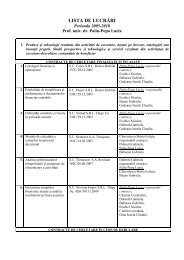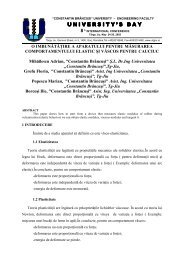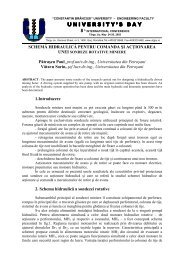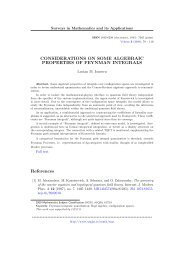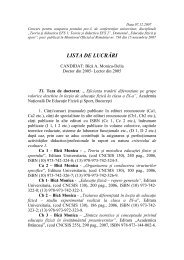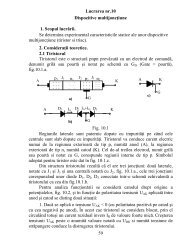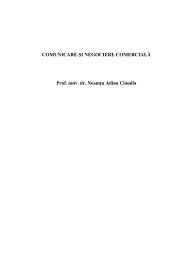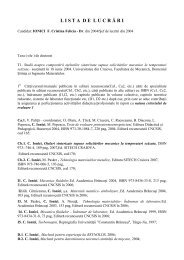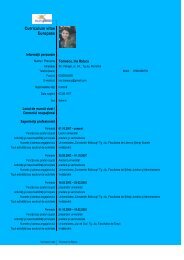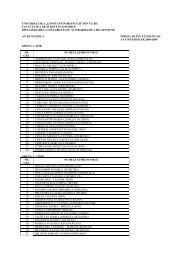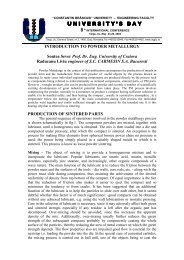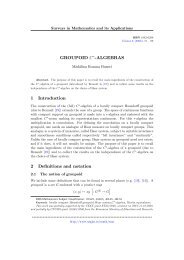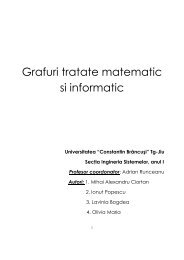Analele Universităţii “<strong>Constantin</strong> Brâncuşi” din Târgu Jiu, Seria Litere şi Ştiinţe Sociale, Nr. 2/<strong>2008</strong>umană. În acelaşi timp, devine critică şiselectivă: Nu se poate pune pe acelaşi plan ocunoaştere elementară, intrinsecă (atribut alontisului uman), care se regăseşte în codulgenetic „uman”, în proiectul existenţial alfiinţei umane (ca şi componentă a vieţii), cu ocunoaştere obiectivată, critică, reflexivă. Ocunoaştere elementară reprezintăuniversalitatea şi identitatea fiinţei umane – cafiinţă bio-psihică, socio-culturală şi acţională,şi este „cunoaştere sau gândire în senssubiectiv, constând într-o stare a minţii sau aconştiinţei sau o dispoziţie spre comportaresau reacţii 2 ”. Prin comparaţie (deşigradualitatea planurilor este evidenţă),cunoaşterea obiectivată, controlată critic,reprezintă „cunoaştere sau gândire în sensobiectiv, constând în probleme, teorii şiargumente ca atare” 3 .Cunoaşterea elementară este spontană,supusă deopotrivă unor orizonturi de libertăţişi constrângeri izvorâte atât din codul genetic,cât şi din situaţiile de viaţă (individuală şi degrup); cunoaşterea obiectivată esteintenţionată, obţinută prin activităţi speciale şispecializate, urmând explicit anumite idealuride justeţe, autenticitate şi punere la probă.Cunoaşterea obiectivată este cunoaştereaepistemică (ştiinţifică).La scară culturală şi istorică se potidentifica sisteme de cunoaştere mai mult saumai puţin integrate, proprii unor comunităţiumane determinate, sisteme în care suntstructurate diferite genuri de cunoaştere(diferenţiate, sintetizate şi ierarhizate mobil):a) cunoaştere perceptivă, de simţcomun; b) cunoaştere tehnico-pragmatică; c)cunoaştere ştiinţifică; d) cunoaştere filosofică;e) cunoaştere mitică; f) cunoaştere religioasă;g) cunoaştere artistică.Totodată, tuturor formelor de conştiinţăşi ideologiilor (coercitive sau non-coercitive) lise asociază momente şi coeficienţi decunoaştere specifică. Apoi, în cadrul genurilorde cunoaştere, pot fi identificate formele decunoaştere:a) empirică - teoretică; b) pozitivă -speculativă; c) intuitivă - reflexivă;e)reprezentativă-simbolică; f) individuală -and existential feature of man cannot be denied.This judgement becomes indicative: a certainmoment of knowledge is involved in anyhuman activity and commitment. At the sametime, it becomes critical and selective: wecannot put at the same level an elementary,intrinsic knowledge (human ontis attribute),found in the human genetic code, in theexistential project of the human being (as acomponent of life), with an objective, critical,reflexive knowledge. The elementaryknowledge represents the universality andidentity of the human being – as bio-psychicbeing, socio-cultural and action being, and it is“knowledge or thought in subjective meaning,consisting of a state of mind or consciousness ora disposition towards behaviour or reactions 17 ”.By comparison (although the gradualness of theplans is obvious), the objective knowledge,critically controlled, represents knowledge orthought in objective meaning, consisting ofproblems, theories and arguments as such” 18 .Elementary knowledge is spontaneous,subdued at the same time to some freedom andconstraints horizons appeared both from thegenetic code and the life situations (individualand group); objective knowledge is intentional,obtained through special and specializedactivities, explicitly following some justness,authenticity and probation ideals. Objectiveknowledge is the epistemic (scientific)knowledge.At cultural and historical scale, we canidentify knowledge systems more or lessintegrated, proper to some human communities,systems where there are structured differenttypes of knowledge (differentiated, synthesized,and hierarchised):a) perceptive knowledge, of commonsense; b) technical and pragmatic knowledge’ c)scientific knowledge; d) philosophicalknowledge; e) mythical knowledge; f) religiousknowledge; g) artistic knowledge.At the same time, all the forms ofconscience and ideologies (coercive or noncoercive)are associated with moments andcoefficients of specific knowledge. Then, withinthe framework of knowledge types, thefollowing forms of knowledge may beAnnals of the „<strong>Constantin</strong> Brâncuşi” University of Târgu Jiu, Series Letters and Social Sciences, No. 2/<strong>2008</strong>6
Analele Universităţii “<strong>Constantin</strong> Brâncuşi” din Târgu Jiu, Seria Litere şi Ştiinţe Sociale, Nr. 2/<strong>2008</strong>colectivă ş.a.Aşadar, se discută despre tipuri decunoaştere:1. elementară, spontană, comună,subiectivă;2. obiectivată, elaborată, reflexivă,critică, ştiinţifică, sisteme de cunoaştere,genuri şi forme de cunoaştere; genurile şiformele de cunoaştere, se caracterizează şi prinmodalităţile lor variabile de expresie,comunicare şi difuzare.În abordarea de faţă 4 , ţinând cont deprocesualitatea cunoaşterii în general, acunoaşterii ştiinţifice, în special, dar şi decâştigurile rezultate din disputa empirismraţionalism(mediate în epoca modernă decriticismul kantian), suntem preocupaţi deilustrarea relaţiei: cunoaştere ştiinţifică-cultură(îndeosebi cultura politică)- progresuldemocraţiei. Vom insista pe deosebirea dintresistemul de cunoştinţe ştiinţifice şi sistemul deopinii, pe evidenţierea acelor domenii alerealului care sunt susceptibile de o cunoaşterecertă (comparaţii cu domenii în carecertitudinile sunt subordonate statisticului), penevoia trecerii (în procesul cunoaşterii) de laaparenţa înşelătoare a lucrurilor la sesizareaesenţei lor, pe existenţa sau non-existenţamijloacelor adecvate de care dispune subiectul,la un moment dat, spre a stabili validitateaunor rezultate ale cunoaşterii sau, măcar,anumite grade de verosimilitate a ei.Bipolaritatea şi procesualitateacunoaşterii trebuie analizate prin raportareasubiectului ei finit (o finitudine determinatăprin recunoaşterea limitelor genetice,existenţiale, potenţial-acţionale – inclusiv deperformanţele limitate ale mijloacelor deinvestigare) la obiectul infinit (infinitudinespaţio-temporală, dar şi a formelor diverse demanifestare). Totodată, trebuie ţinut cont de oevidenţă: aceea că problemele şi soluţiilegnoseologice vizează şi o stare determinată acunoaşterii (subiective şi ştiinţifice), purtând,de regulă, amprenta genurilor şi formelor decunoaştere care, în fiecare epocă, s-au bucuratde prestigiu epistemologic, având chiar rolparadigmatic.Cunoaşterea cunoaşterii nu dispune deidentified:a) empirical – theoretical; b) positive –speculative; c) intuitive - reflexive; e)representative – symbolic; f) individual -collective ş.a.therefore, we discuss of types ofknowledge:1. elementary, spontaneous, common,subjective;2. objectived, elaborated, reflexive, critical,scientific, knowledge systems, generaand forms of knowledge; the types andforms of knowledge , characterized bytheir variable modalities of expression,communication, and diffusion.In this approach 19 , taking intoconsideration the gradual character ofknowledge in general, but also by the benefitsresulting from the empiricism – rationalismdispute (mediated in the modern age by Kant'scriticism), we are concerned by illustrating therelation: scientific knowledge – culture(especially political culture) – the progress ofdemocracy. We will focus on the differencebetween the scientific knowledge system andthe system of opinions, on highlighting thosefield of reality liable of a certain knowledge(comparisons with fields where certitudes aresubordinated to statistics), on the need ofpassing (within the process of knowledge) fromthe misleading appearance of things to theobservation of their essence, on the existence ornon-existence of adequate means of the subjectat a certain point, in order to establish thevalidity of some knowledge results or at leastcertain degrees of its credibility.Knowledge bipolarity and gradualcharacter have to be analyzed by reporting itsfinite subject (a finitudine established byadmitting the genetic, existential, potential –action limitations of the investigation means) tothe infinite object (spatial and temporal infiniteand various forms of manifestation). At thesame time, we have to take into considerationone evidence: that gnoseologic problems andsolutions also focus on a determined state ofknowledge (subjective and scientific), havingthe fingerprint of genera and forms ofknowledge which, in every age, have had anAnnals of the „<strong>Constantin</strong> Brâncuşi” University of Târgu Jiu, Series Letters and Social Sciences, No. 2/<strong>2008</strong>7
- Page 5: CUPRINS:1. CUNOAŞTERE - CULTURĂ
- Page 10 and 11: Analele Universităţii “Constant
- Page 12 and 13: Analele Universităţii “Constant
- Page 14 and 15: Analele Universităţii “Constant
- Page 16 and 17: Analele Universităţii “Constant
- Page 18 and 19: Analele Universităţii “Constant
- Page 20 and 21: Analele Universităţii “Constant
- Page 22 and 23: Analele Universităţii “Constant
- Page 24 and 25: Analele Universităţii “Constant
- Page 26 and 27: Analele Universităţii “Constant
- Page 28 and 29: Analele Universităţii “Constant
- Page 30 and 31: Analele Universităţii “Constant
- Page 32 and 33: Analele Universităţii “Constant
- Page 34 and 35: Analele Universităţii “Constant
- Page 36 and 37: Analele Universităţii “Constant
- Page 38 and 39: Analele Universităţii “Constant
- Page 40 and 41: Analele Universităţii “Constant
- Page 42 and 43: Analele Universităţii “Constant
- Page 44 and 45: Analele Universităţii “Constant
- Page 46 and 47: Analele Universităţii “Constant
- Page 48 and 49: Analele Universităţii “Constant
- Page 50 and 51: Analele Universităţii “Constant
- Page 52 and 53: Analele Universităţii “Constant
- Page 54 and 55: Analele Universităţii “Constant
- Page 56 and 57: Analele Universităţii “Constant
- Page 58 and 59:
Analele Universităţii “Constant
- Page 60 and 61:
Analele Universităţii “Constant
- Page 62 and 63:
Analele Universităţii “Constant
- Page 64 and 65:
Analele Universităţii “Constant
- Page 66 and 67:
Analele Universităţii “Constant
- Page 68 and 69:
Analele Universităţii “Constant
- Page 70 and 71:
Analele Universităţii “Constant
- Page 72 and 73:
Analele Universităţii “Constant
- Page 74 and 75:
Analele Universităţii “Constant
- Page 76 and 77:
Analele Universităţii “Constant
- Page 78 and 79:
Analele Universităţii “Constant
- Page 80 and 81:
Analele Universităţii “Constant
- Page 82 and 83:
Analele Universităţii “Constant
- Page 84 and 85:
Analele Universităţii “Constant
- Page 86 and 87:
Analele Universităţii “Constant
- Page 88 and 89:
Analele Universităţii “Constant
- Page 90 and 91:
Analele Universităţii “Constant
- Page 92 and 93:
Analele Universităţii “Constant
- Page 94 and 95:
Analele Universităţii “Constant
- Page 96 and 97:
Analele Universităţii “Constant
- Page 98 and 99:
Analele Universităţii “Constant
- Page 100 and 101:
Analele Universităţii “Constant
- Page 102 and 103:
Analele Universităţii “Constant
- Page 104 and 105:
Analele Universităţii “Constant
- Page 106 and 107:
Analele Universităţii “Constant
- Page 108 and 109:
Analele Universităţii “Constant
- Page 110 and 111:
Analele Universităţii “Constant
- Page 112 and 113:
Analele Universităţii “Constant
- Page 114 and 115:
Analele Universităţii “Constant
- Page 116 and 117:
Analele Universităţii “Constant
- Page 118 and 119:
Analele Universităţii “Constant
- Page 120 and 121:
Analele Universităţii “Constant
- Page 122 and 123:
Analele Universităţii “Constant
- Page 124 and 125:
Analele Universităţii “Constant
- Page 126 and 127:
Analele Universităţii “Constant
- Page 128 and 129:
Analele Universităţii “Constant
- Page 130 and 131:
Analele Universităţii “Constant
- Page 132 and 133:
Analele Universităţii “Constant
- Page 134 and 135:
Analele Universităţii “Constant
- Page 136 and 137:
Analele Universităţii “Constant
- Page 138 and 139:
Analele Universităţii “Constant
- Page 140 and 141:
Analele Universităţii “Constant
- Page 142 and 143:
Analele Universităţii “Constant
- Page 144 and 145:
Analele Universităţii “Constant
- Page 146 and 147:
Analele Universităţii “Constant
- Page 148 and 149:
Analele Universităţii “Constant
- Page 150 and 151:
Analele Universităţii “Constant
- Page 152 and 153:
Analele Universităţii “Constant
- Page 154 and 155:
Analele Universităţii “Constant
- Page 156 and 157:
Analele Universităţii “Constant
- Page 158 and 159:
Analele Universităţii “Constant
- Page 160 and 161:
Analele Universităţii “Constant
- Page 162 and 163:
Analele Universităţii “Constant
- Page 164 and 165:
Analele Universităţii “Constant
- Page 166 and 167:
Analele Universităţii “Constant
- Page 168 and 169:
Analele Universităţii “Constant
- Page 170 and 171:
Analele Universităţii “Constant
- Page 172 and 173:
Analele Universităţii “Constant
- Page 174 and 175:
Analele Universităţii “Constant
- Page 176 and 177:
Analele Universităţii “Constant
- Page 178 and 179:
Analele Universităţii “Constant
- Page 180 and 181:
Analele Universităţii “Constant
- Page 182 and 183:
Analele Universităţii “Constant
- Page 184 and 185:
Analele Universităţii “Constant
- Page 186 and 187:
Analele Universităţii “Constant
- Page 188 and 189:
Analele Universităţii “Constant
- Page 190 and 191:
Analele Universităţii “Constant
- Page 192 and 193:
Analele Universităţii “Constant
- Page 194 and 195:
Analele Universităţii “Constant
- Page 196 and 197:
Analele Universităţii “Constant
- Page 198 and 199:
Analele Universităţii “Constant
- Page 200 and 201:
Analele Universităţii “Constant
- Page 202 and 203:
Analele Universităţii “Constant



